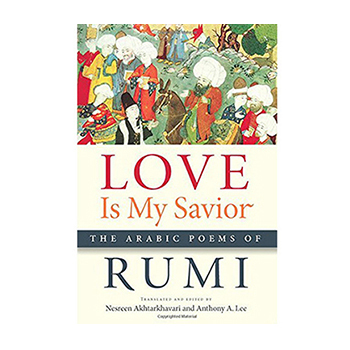By Nesreen Akhtarkhavari and Anthony A. Lee, Translators | (Informed Comment) | – –
The poems of Rumi, the thirteenth-century teacher, scholar, and poet known simply as Mowlana in the Muslim world, have shaped Islamic culture for centuries. They still stand just as vital after eight hundred years. Rumi speaks to us of unchanging spiritual realities and the universal quest for inner peace. His poems make a convincing argument for the central role of love in Islamic texts and traditions. Rumi found in mystical poetry a vehicle for the expression of the endless spiritual bounties of love. This became the center of his faith and practice and his connection with the divine. He pronounced love to be the goal of his life and the only form of true worship.
This new volume of Rumi’s works, in Arabic and English, the first-ever English translation of his Arabic poems, will be exciting for the newcomer as well as to readers already familiar with his mystical philosophy. The poems take the reader on a journey of spiritual exploration, erotic longing, ecstatic union, cruel rejection, and mystic reconciliation. Rumi reveals his soul and welcomes everyone witness his spiritual journey.
Rumi’s Arabic verses are straightforward, and his metaphors are intense. It might be thought that in the Arabic we discover the free spirit of Rumi, unbound by the polite and romantic traditions of Persian verse. Many of these poems may appear, to the Western reader at least, to be surprisingly erotic. But those familiar with Rumi’s poems will not be surprised to find frank and open expressions of physical love and sexual desire. The poet fully embraces the language of sexuality to express his love for Shams-e Tabrizi, his dervish teacher, his mystic guide, and his companion, as a metaphor for his love for the divine. In some instances, Rumi’s verses are full-bodied and intimate, as the lover addresses his beloved Shams. All of Rumi’s poems are equally transgressive, celebrating love, wine, drunkenness, madness—even death—as paths to the spirit.
Here we give as an example, the poem “Drunken Brothers”:
You! who make the full moon stand ashamed,
come here and shine your brightest light on me.
You! who pour out nectar for the soul.
Come here! Make me as drunk as drunk can be.
Don’t stop! More! Give me all the wine I claim,
till you and I two drunken brothers be,
back and forth, vying over ecstasy.
Now, I’m so drunk I can’t recall your name
or find your face. I’m filled with mystery,
wine that saves me from spite and misery.
Or these lines from “A Dream,” that celebrate Rumi’s love of fellow mystic Shams al-Din Tabrizi:
You flashed your eyes. O Moon! They pierced my chest.
You spoke the words, and so my heart was blessed.
You filled me with desire, gave me a taste.
When you drew near, I smiled at your embrace.
A beggar, I gave thanks to be so base.
My master, you gave me your noble grace!
Rumi invites us all to his celebration with this poem, “We Are All Drunk”:
Come by our place today! We are all drunk.
Our cups are full of wine, and we’re all drunk.
The cup God gave us, it’s running over.
Give thanks, give thanks—thanks for this charity!
Come by our place. It’s a celebration!
Our longing now made plain for all to see.
Our lovers came to us in the dark of night—
in our hearts they left no shame, no anxiety.
Each held in open palms a generous sea,
and scattered jewels for us abundantly.
—–
Translated by Nesreen Akhtarkhavari and Anthony A. Lee; Rumi’s Love is My Savior is available here




 © 2025 All Rights Reserved
© 2025 All Rights Reserved